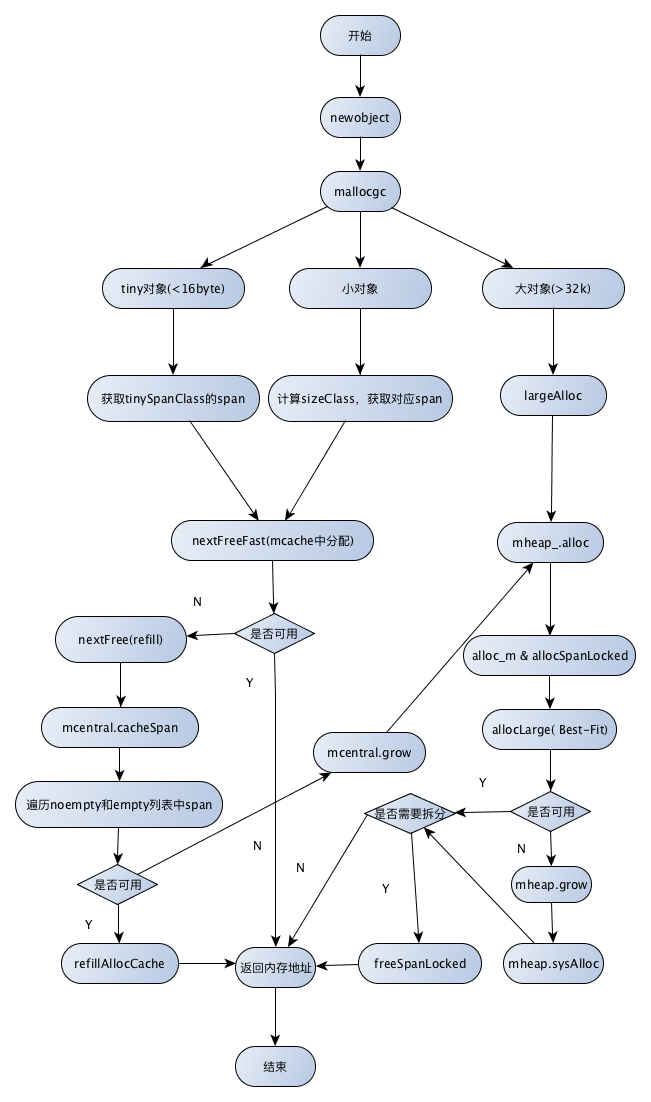Go-深入理解内存分配
深入理解内存分配
CPU缓存
CPU的发展的速度远快于内存的发展,CPU的处理速度也比内存访问速度快很多。这样很多情况下,CPU必须要等内存的相应,为了应对这种情况,CPU多谢缓存就出现了。
计算机内存金字塔图

 缓存大小L1<L2<L3, 速度L1>L2>L3, L1和L2通常用在单核中,L3则用来多核中。CPU缓存的命中率代表了CPU缓存复用的情况。 CPU读取数据是从先从缓存中寻找,如果找到就立即返回给CPU处理,如果没有找到,就从相对慢的速度中读取并返回给CPU处理,同时把这个数据加入缓存中。
缓存大小L1<L2<L3, 速度L1>L2>L3, L1和L2通常用在单核中,L3则用来多核中。CPU缓存的命中率代表了CPU缓存复用的情况。 CPU读取数据是从先从缓存中寻找,如果找到就立即返回给CPU处理,如果没有找到,就从相对慢的速度中读取并返回给CPU处理,同时把这个数据加入缓存中。
程序内存
unix系统进程内存占用示意图
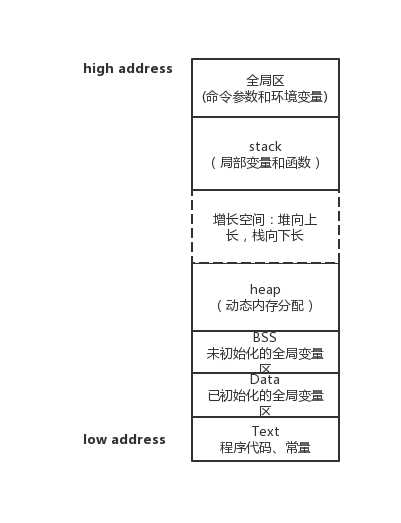
- text段在内存映射中是只读的,data和bss是可读可写
- data和bss属于静态内存分配。data是初始化过的,bss是未出华的
TCmalloc
TCmalloc全称Thread-Cacheing Malloc, 即线程缓存的malloc,是由Google开发的内存分配器(https://gperftools.github.io/gperftools/tcmalloc.html)。
TCmalloc通过多级缓存,降低了多线程中锁竞争的情况,通过不同的sizeclass,空间利用率高,碎片少。
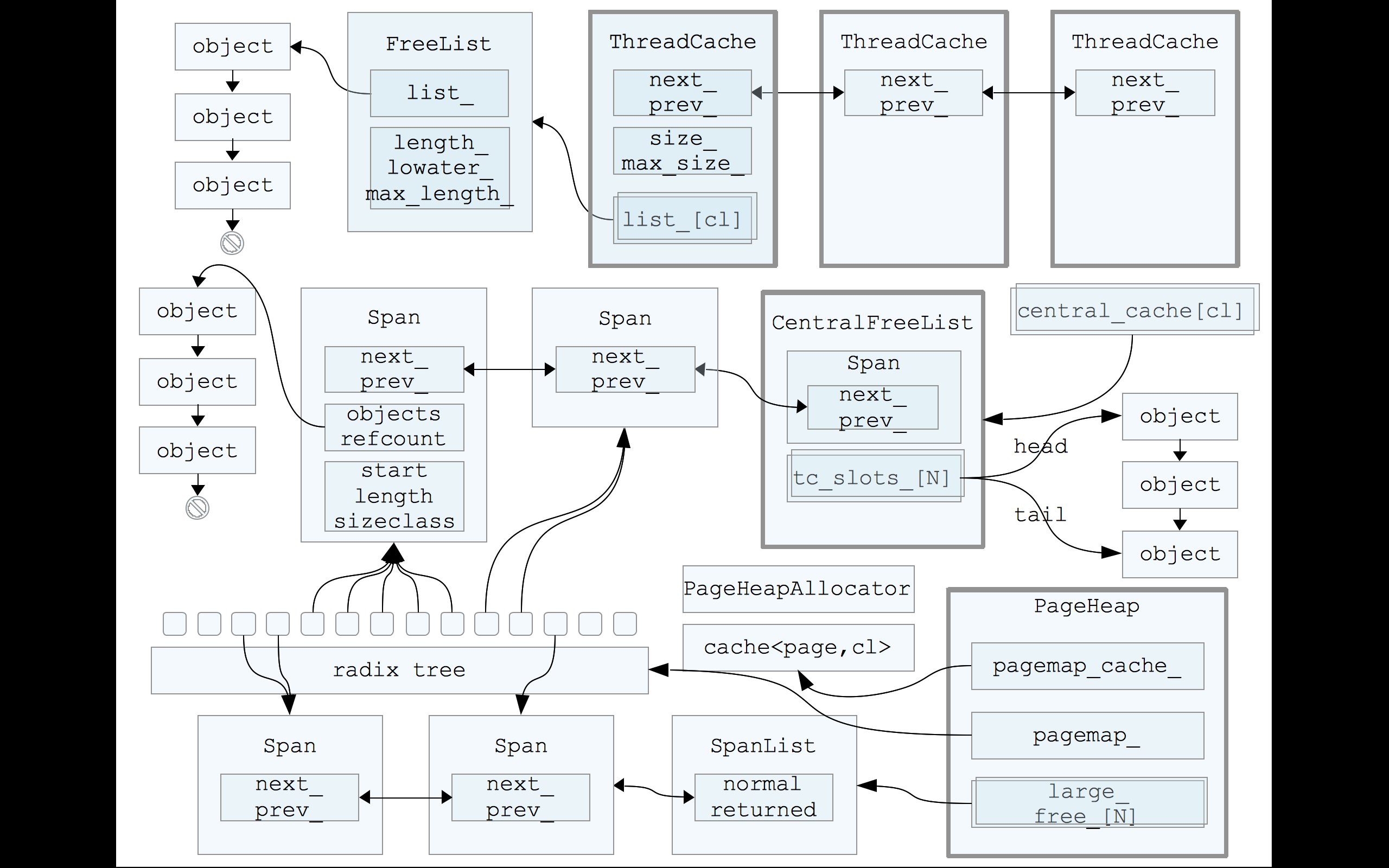
如果想了解细节可以看下:
Go内存分配
Golang内存分配最开始也是TCmalloc的,后来再次基础上也改动了许多,包括内存池、预分配和延迟分配等。
介绍
Page: Golang里面的Page大小是8KB(x64操作系统页一般是4KB),一般是操作系统页的几倍 maxTinySize: 小于16Byte tinySizeClass: 16B < size <= 32KB maxSmallSize: size > 32K Spans: 存放mspan的指针,指针大小是8byte,每个指针指向arena的一个page bitmap:用于保存arena对应某个地址是否存在对象,以及对象是否被GC扫描过 arena:由一堆page组成 object:
从别的地方引用的一张内存管理图
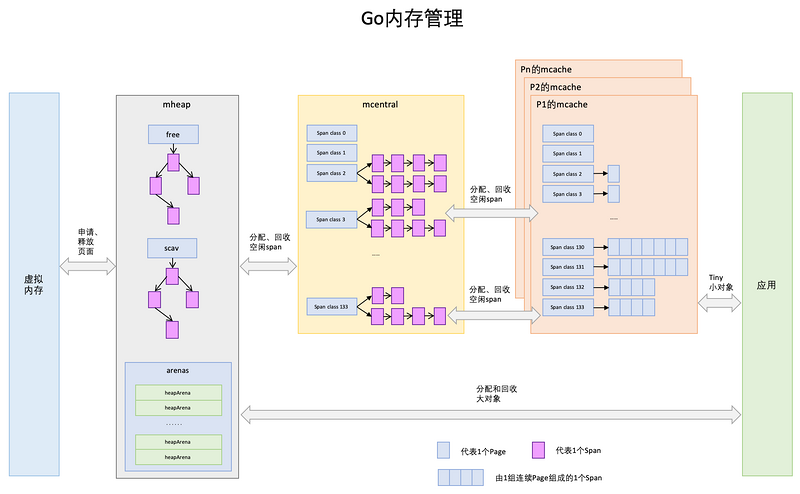
go内存结构
 总共分为3个区域,spans,bitmap和areaa
总共分为3个区域,spans,bitmap和areaa
mspan
每个mspan对一个一个page
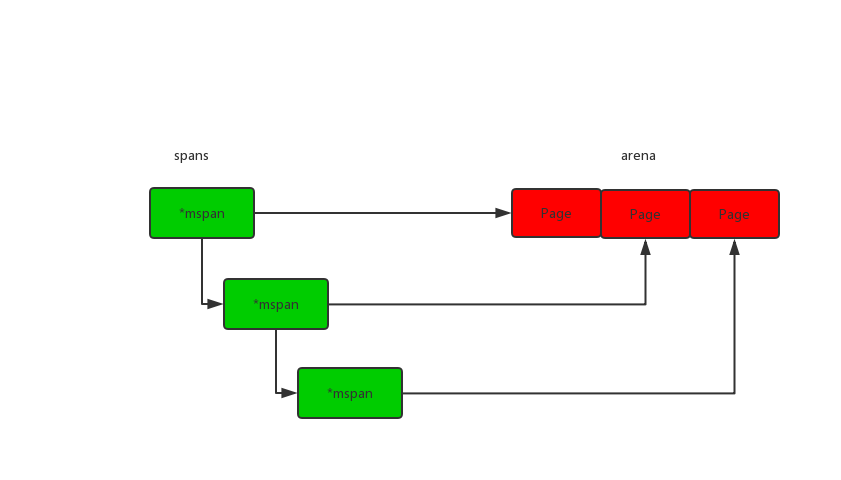
bitmap
每个bitmap对应arena 4个指针的内存,相当于2bit对应1个指针大小的内存,两个2bit分别代表是否指针和是否应该扫描

size class
每个mspan会按照SizeClass的大小分配成若干的object,每个object可以存储一个对象。并且使用allocBits表示object使用情况,mspan会按照上面的分配原则给object分配对象
// class bytes/obj bytes/span objects tail waste max waste
// 1 8 8192 1024 0 87.50%
// 2 16 8192 512 0 43.75%
// 3 32 8192 256 0 46.88%
// 4 48 8192 170 32 31.52%
// 5 64 8192 128 0 23.44%
// 6 80 8192 102 32 19.07%
// 7 96 8192 85 32 15.95%
// 8 112 8192 73 16 13.56%
// 9 128 8192 64 0 11.72%
// 10 144 8192 56 128 11.82%
// 11 160 8192 51 32 9.73%
// 12 176 8192 46 96 9.59%
// 13 192 8192 42 128 9.25%
// 14 208 8192 39 80 8.12%
// 15 224 8192 36 128 8.15%
// 16 240 8192 34 32 6.62%
// 17 256 8192 32 0 5.86%
// 18 288 8192 28 128 12.16%
// 19 320 8192 25 192 11.80%
// 20 352 8192 23 96 9.88%
// 21 384 8192 21 128 9.51%
// 22 416 8192 19 288 10.71%
// 23 448 8192 18 128 8.37%
// 24 480 8192 17 32 6.82%
// 25 512 8192 16 0 6.05%
// 26 576 8192 14 128 12.33%
// 27 640 8192 12 512 15.48%
// 28 704 8192 11 448 13.93%
// 29 768 8192 10 512 13.94%
// 30 896 8192 9 128 15.52%
// 31 1024 8192 8 0 12.40%
// 32 1152 8192 7 128 12.41%
// 33 1280 8192 6 512 15.55%
// 34 1408 16384 11 896 14.00%
// 35 1536 8192 5 512 14.00%
// 36 1792 16384 9 256 15.57%
// 37 2048 8192 4 0 12.45%
// 38 2304 16384 7 256 12.46%
// 39 2688 8192 3 128 15.59%
// 40 3072 24576 8 0 12.47%
// 41 3200 16384 5 384 6.22%
// 42 3456 24576 7 384 8.83%
// 43 4096 8192 2 0 15.60%
// 44 4864 24576 5 256 16.65%
// 45 5376 16384 3 256 10.92%
// 46 6144 24576 4 0 12.48%
// 47 6528 32768 5 128 6.23%
// 48 6784 40960 6 256 4.36%
// 49 6912 49152 7 768 3.37%
// 50 8192 8192 1 0 15.61%
// 51 9472 57344 6 512 14.28%
// 52 9728 49152 5 512 3.64%
// 53 10240 40960 4 0 4.99%
// 54 10880 32768 3 128 6.24%
// 55 12288 24576 2 0 11.45%
// 56 13568 40960 3 256 9.99%
// 57 14336 57344 4 0 5.35%
// 58 16384 16384 1 0 12.49%
// 59 18432 73728 4 0 11.11%
// 60 19072 57344 3 128 3.57%
// 61 20480 40960 2 0 6.87%
// 62 21760 65536 3 256 6.25%
// 63 24576 24576 1 0 11.45%
// 64 27264 81920 3 128 10.00%
// 65 28672 57344 2 0 4.91%
// 66 32768 32768 1 0 12.50%
class: class ID, 每个span都有class ID bytes/obj: 对象的字节数 bytes/span: 每个span占用的字节数 objects: 每个span可以分配的对象 (bytes/span) / (bytes/obj) waste bytes: 每个span产生的碎片, (bytes/span) % (bytes/obj)
这么做有什么好处呢? 可以看下这个图
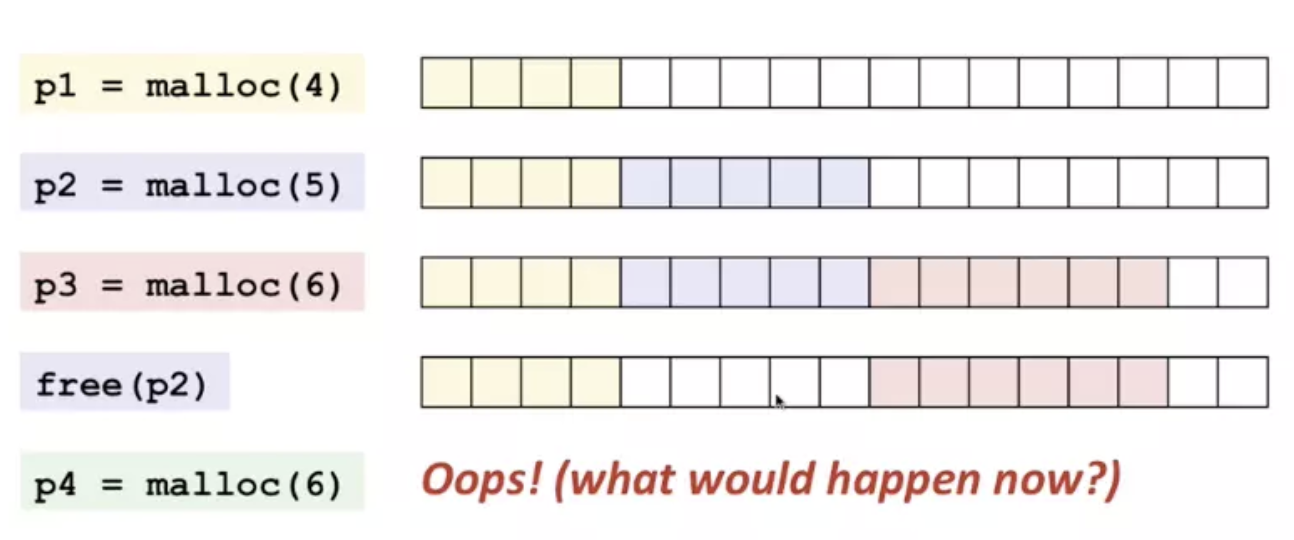 如果p2释放掉后,是不是就会造成有很多内存碎片?
如果p2释放掉后,是不是就会造成有很多内存碎片?
span class
每个Size Class对应两个mspan,一个是含指针对象,一个是不含指针对象的,主要是方便GC
Size_Class = Span_class / 2
mspan
mspan是个双向链表,是go里面最小的管理单元,是由一堆Pages组成的连续内存
type mspan struct {
next *mspan // next span in list, or nil if none
prev *mspan // previous span in list, or nil if none
list *mSpanList // For debugging. TODO: Remove.
startAddr uintptr // span其实地址
npages uintptr // 页数
manualFreeList gclinkptr // list of free objects in mSpanManual spans
// 定位下一个空闲的object, 范围在0~nelems
freeindex uintptr
// object的数量
nelems uintptr // number of object in the span.
// 缓存freeindex开始的bitmap, allocCache是allocBits的补码
allocCache uint64
// 分配位图,每一位代表是否已分配
allocBits *gcBits
// 用于在gc的时候标记哪些对象存活,每次GC后gcmarkBits变成allocBits
gcmarkBits *gcBits
sweepgen uint32
divMul uint16 // for divide by elemsize - divMagic.mul
baseMask uint16 // if non-0, elemsize is a power of 2, & this will get object allocation base
// 已分配的object数量
allocCount uint16 // number of allocated objects
spanclass spanClass // size class and noscan (uint8)
state mSpanState // mspaninuse etc
needzero uint8 // needs to be zeroed before allocation
divShift uint8 // for divide by elemsize - divMagic.shift
divShift2 uint8 // for divide by elemsize - divMagic.shift2
scavenged bool // whether this span has had its pages released to the OS
elemsize uintptr // computed from sizeclass or from npages
unusedsince int64 // first time spotted by gc in mspanfree state
limit uintptr // end of data in span
speciallock mutex // guards specials list
specials *special // linked list of special records sorted by offset.
}
mcache
mcache是每个P单独拥有的,所以不需要锁
type mcache struct {
// numSpanClasses = _NumSizeClasses << 1, 也就是67*2=134
alloc [numSpanClasses]*mspan
}
alloc的分布

span class分为scan和noscan,如果对象含有指针则分为scan,否则分配到noscan,这样在GC的时候,如果对应的是noscan,则不用再去bitmap中找对应的对象
mcentral
mcentral为每个mcache提供mspan, 每个mcentral保存未分配和已分批的span,当mcache没有合适或是空闲的mspan,就会从mcentral申请
type mcentral struct {
lock mutex
spanclass spanClass
nonempty mSpanList // 有空闲Object的mspan的链表
empty mSpanList // 没有空闲Objectde mspan的链表, 或者被mcache取走的mspan链表
// 累计分配object的数量
nmalloc uint64
}
下面两个操作都需要加锁
- 当mcache从mcentral申请mspan的时候,如果noempty中有空闲,那么会从noempty拿走,并加入到empty中
- 归还的话,从empty删除,并加入到noempty中
mheap
mheap是一个全局的内存管理
type mheap struct {
lock mutex
// mTreap 是个二叉排序树,按照span的page数量排序
free mTreap // 保存span是空闲并且非垃圾回收的span
scav mTreap // 保存span是空闲并且垃圾回收的span
// 指向spans区域,
allspans []*mspan // all spans out there
// arenas 是一个map,指向了每个heap arena对应的metadata
// Linux平台上arenaL1Bits是0, arenaL2Bits=heapAddrBits-logHeapArenaBytes(48-26)=22
arenas [1 << arenaL1Bits]*[1 << arenaL2Bits]*heapArena
// 32位平台上预留空闲
arena linearAlloc
// 记录arena的增长地址
arenaHints *arenaHint
// 如果sweepgen == mheap.sweepgen - 2, span需要扫描
// 如果sweepgen == mheap.sweepgen - 1, span正在被扫描
// 如果sweepgen == mheap.sweepgen, span已经扫描完成,等待被使用
// 如果sweepgen == mheap.sweepgen + 1, span已经被缓存,现在仍然缓存中,则需要扫描
// 如果sweepgen == mheap.sweepgen + 3, span已经扫描过了,还处在缓存中
sweepgen uint32
// central 是一个针对小对象(32KB)的列表,用spanClass索引
central [numSpanClasses]struct {
mcentral mcentral
pad [cpu.CacheLinePadSize - unsafe.Sizeof(mcentral{})%cpu.CacheLinePadSize]byte
}
spanalloc fixalloc // allocator for span*
cachealloc fixalloc // allocator for mcache*
treapalloc fixalloc // allocator for treapNodes*
specialfinalizeralloc fixalloc // allocator for specialfinalizer*
specialprofilealloc fixalloc // allocator for specialprofile*
}
heapArena
heapArena 保存heap arena的元数据
type heapArena struct {
// bitmap表示arena哪些地址保存了对象, heapArenaBitmapBytes是2048K
bitmap [heapArenaBitmapBytes]byte
// spans 保存了page和mspan的对应关系, pagesPerArena是8KB
spans [pagesPerArena]*mspan
// pageInUse is a bitmap that indicates which spans are in
// state mSpanInUse. This bitmap is indexed by page number,
// but only the bit corresponding to the first page in each
// span is used.
//
// Writes are protected by mheap_.lock.
pageInUse [pagesPerArena / 8]uint8
// pageMarks is a bitmap that indicates which spans have any
// marked objects on them. Like pageInUse, only the bit
// corresponding to the first page in each span is used.
//
// Writes are done atomically during marking. Reads are
// non-atomic and lock-free since they only occur during
// sweeping (and hence never race with writes).
//
// This is used to quickly find whole spans that can be freed.
//
// TODO(austin): It would be nice if this was uint64 for
// faster scanning, but we don't have 64-bit atomic bit
// operations.
pageMarks [pagesPerArena / 8]uint8
}
分配过程
newobject
从堆上分配对象会从newobject
func newobject(typ *_type) unsafe.Pointer {
return mallocgc(typ.size, typ, true)
}
mallocgc
mallocgc 代码非常长,这里我们一种一种情况说
func mallocgc(size uintptr, typ *_type, needzero bool) unsafe.Pointer {
// 省略...
// 判断是否需要辅助GC工作
var assistG *g
if gcBlackenEnabled != 0 {
// Charge the current user G for this allocation.
assistG = getg()
if assistG.m.curg != nil {
assistG = assistG.m.curg
}
// Charge the allocation against the G. We'll account
// for internal fragmentation at the end of mallocgc.
assistG.gcAssistBytes -= int64(size)
if assistG.gcAssistBytes < 0 {
// This G is in debt. Assist the GC to correct
// this before allocating. This must happen
// before disabling preemption.
gcAssistAlloc(assistG)
}
}
// 设置m的mallocing,防止被抢占
mp := acquirem()
if mp.mallocing != 0 {
throw("malloc deadlock")
}
if mp.gsignal == getg() {
throw("malloc during signal")
}
mp.mallocing = 1
shouldhelpgc := false
dataSize := size
// 获取mcache
c := gomcache()
// 省略...
}
小对象(<=32KB)
// 如果是极小对象(<16B)并且对象不包含指针,则进行特殊处理
if noscan && size < maxTinySize {
// 因为span最小是8byte,如果是过小的对象,也会被浪费掉,非常小的对象可以整合在class 2 noscan(大小为16 byte)
off := c.tinyoffset
// Align tiny pointer for required (conservative) alignment.
if size&7 == 0 {
off = round(off, 8)
} else if size&3 == 0 {
off = round(off, 4)
} else if size&1 == 0 {
off = round(off, 2)
}
if off+size <= maxTinySize && c.tiny != 0 {
// The object fits into existing tiny block.
x = unsafe.Pointer(c.tiny + off)
c.tinyoffset = off + size
c.local_tinyallocs++
mp.mallocing = 0
releasem(mp)
return x
}
// tinySpanClass = 5, 按照span class排列,正好的16byte noscan span class
span := c.alloc[tinySpanClass]
v := nextFreeFast(span)
if v == 0 {
v, _, shouldhelpgc = c.nextFree(tinySpanClass)
}
x = unsafe.Pointer(v)
(*[2]uint64)(x)[0] = 0
(*[2]uint64)(x)[1] = 0
// See if we need to replace the existing tiny block with the new one
// based on amount of remaining free space.
if size < c.tinyoffset || c.tiny == 0 {
c.tiny = uintptr(x)
c.tinyoffset = size
}
size = maxTinySize
} else {
// 其他按小对象分配
var sizeclass uint8
// 按size大小判断应该落在哪个span类型上
if size <= smallSizeMax-8 {
sizeclass = size_to_class8[(size+smallSizeDiv-1)/smallSizeDiv]
} else {
sizeclass = size_to_class128[(size-smallSizeMax+largeSizeDiv-1)/largeSizeDiv]
}
size = uintptr(class_to_size[sizeclass])
// 等于sizeclass * 2
spc := makeSpanClass(sizeclass, noscan)
span := c.alloc[spc]
v := nextFreeFast(span)
if v == 0 {
// 如果分配失败,需要从mcentral或者mheap中获取
// 如果分配到了shouldhelpgc会返回true,接下来会判断是否触发GC
v, span, shouldhelpgc = c.nextFree(spc)
}
x = unsafe.Pointer(v)
if needzero && span.needzero != 0 {
memclrNoHeapPointers(unsafe.Pointer(v), size)
}
}
对象(>32KB)
// 大对象直接从mheap分配, 这个class是0
var s *mspan
shouldhelpgc = true
systemstack(func() {
s = largeAlloc(size, needzero, noscan)
})
s.freeindex = 1
s.allocCount = 1
x = unsafe.Pointer(s.base())
size = s.elemsize
后续
// 如果是指针对象,需要设置对应的bitmap,记录哪些位置包含了指针
if !noscan {
if typ == deferType {
dataSize = unsafe.Sizeof(_defer{})
}
heapBitsSetType(uintptr(x), size, dataSize, typ)
if dataSize > typ.size {
// Array allocation. If there are any
// pointers, GC has to scan to the last
// element.
if typ.ptrdata != 0 {
scanSize = dataSize - typ.size + typ.ptrdata
}
} else {
scanSize = typ.ptrdata
}
c.local_scan += scanSize
}
// ...
// GC中发生了分配,则将对象标记为“黑色”,防止回收
if gcphase != _GCoff {
gcmarknewobject(uintptr(x), size, scanSize)
}
// 允许抢占
mp.mallocing = 0
releasem(mp)
// Profile记录
if rate := MemProfileRate; rate > 0 {
if rate != 1 && int32(size) < c.next_sample {
c.next_sample -= int32(size)
} else {
mp := acquirem()
profilealloc(mp, x, size)
releasem(mp)
}
}
if assistG != nil {
// Account for internal fragmentation in the assist
// debt now that we know it.
assistG.gcAssistBytes -= int64(size - dataSize)
}
// 如果之前获取了新的span,需要启动下gc
if shouldhelpgc {
if t := (gcTrigger{kind: gcTriggerHeap}); t.test() {
gcStart(t)
}
}
nextFreeFast
快速分配
func nextFreeFast(s *mspan) gclinkptr {
// 获取第一个非0的bit是第几bit(从右边排),用来判断是否未分配
theBit := sys.Ctz64(s.allocCache)
// 如果有未分配的,
if theBit < 64 {
result := s.freeindex + uintptr(theBit)
// 索引值小于当前元素数量
if result < s.nelems {
// 下一个freeidx
freeidx := result + 1
// 如果是64的倍数,需要特殊处理
if freeidx%64 == 0 && freeidx != s.nelems {
return 0
}
// 更新freeindex和allocCache
s.allocCache >>= uint(theBit + 1)
s.freeindex = freeidx
// 更新计数器
s.allocCount++
return gclinkptr(result*s.elemsize + s.base())
}
}
return 0
}
nextFree
如果nextFreeFast没有分配到元素,则需要调用nextFree
func (c *mcache) nextFree(spc spanClass) (v gclinkptr, s *mspan, shouldhelpgc bool) {
// 获取目标span
s = c.alloc[spc]
shouldhelpgc = false
// 获取下一个freeIndex
freeIndex := s.nextFreeIndex()
// span已经满了
if freeIndex == s.nelems {
if uintptr(s.allocCount) != s.nelems {
println("runtime: s.allocCount=", s.allocCount, "s.nelems=", s.nelems)
throw("s.allocCount != s.nelems && freeIndex == s.nelems")
}
// 申请新的span
c.refill(spc)
// 标记检查gc
shouldhelpgc = true
s = c.alloc[spc]
freeIndex = s.nextFreeIndex()
}
if freeIndex >= s.nelems {
throw("freeIndex is not valid")
}
// 返回元素所在的地址
v = gclinkptr(freeIndex*s.elemsize + s.base())
// 分配计数++
s.allocCount++
if uintptr(s.allocCount) > s.nelems {
println("s.allocCount=", s.allocCount, "s.nelems=", s.nelems)
throw("s.allocCount > s.nelems")
}
return
}
refill
当mache中没有空闲的span时候,需要调用refill申请新的span 注: refill过程中,已经标记G不能被抢占
func (c *mcache) refill(spc spanClass) {
// Return the current cached span to the central lists.
s := c.alloc[spc]
// 确保元素已经分配完
if uintptr(s.allocCount) != s.nelems {
throw("refill of span with free space remaining")
}
// 设置sweepgen属性,
if s != &emptymspan {
// 将这个span标记为不在缓存
if s.sweepgen != mheap_.sweepgen+3 {
throw("bad sweepgen in refill")
}
atomic.Store(&s.sweepgen, mheap_.sweepgen)
}
// 从mcenral 申请一个新的span
s = mheap_.central[spc].mcentral.cacheSpan()
if s == nil {
throw("out of memory")
}
if uintptr(s.allocCount) == s.nelems {
throw("span has no free space")
}
// 将此标记为已扫描
s.sweepgen = mheap_.sweepgen + 3
// 将当前span加入到mcache中
c.alloc[spc] = s
}
cacheSpan
从mcentral获取span
func (c *mcentral) cacheSpan() *mspan {
// 需要分配span的字节大小
spanBytes := uintptr(class_to_allocnpages[c.spanclass.sizeclass()]) * _PageSize
deductSweepCredit(spanBytes, 0)
// 加锁
lock(&c.lock)
traceDone := false
if trace.enabled {
traceGCSweepStart()
}
sg := mheap_.sweepgen
retry:
var s *mspan
// 从nonempty中获取mspan
for s = c.nonempty.first; s != nil; s = s.next {
// sweepgen == mheap_.sweepgen, 表示span已经sweep
// sweepgen == mheap_.sweepgen - 1,表示span正在sweep
// sweepgen == mheap_.sweepgen - 2, 表示span还没sweep
if s.sweepgen == sg-2 && atomic.Cas(&s.sweepgen, sg-2, sg-1) {
// 如果获取到了,将nonempty移除,并加入到empty,
c.nonempty.remove(s)
c.empty.insertBack(s)
unlock(&c.lock)
s.sweep(true)
goto havespan
}
// 如果span正在被其他线程sweep,跳过
if s.sweepgen == sg-1 {
continue
}
// sweep已经sweep,noempty至少有1个未分配的span,直接分配
c.nonempty.remove(s)
c.empty.insertBack(s)
unlock(&c.lock)
goto havespan
}
// 从empty中获取mspan
for s = c.empty.first; s != nil; s = s.next {
// span正在等待sweep
if s.sweepgen == sg-2 && atomic.Cas(&s.sweepgen, sg-2, sg-1) {
// 从empty中移除,并加入到链表末尾
c.empty.remove(s)
c.empty.insertBack(s)
unlock(&c.lock)
// TODO: 尝试sweep
s.sweep(true)
// 检查下是否有未分配的对象,有则分配
freeIndex := s.nextFreeIndex()
if freeIndex != s.nelems {
s.freeindex = freeIndex
goto havespan
}
lock(&c.lock)
// the span is still empty after sweep
// it is already in the empty list, so just retry
goto retry
}
if s.sweepgen == sg-1 {
// the span is being swept by background sweeper, skip
continue
}
// 找不到未分配对象的span
break
}
if trace.enabled {
traceGCSweepDone()
traceDone = true
}
unlock(&c.lock)
// Replenish central list if empty.
// 如果依然没找到,则从mheap分配,分配后直接加入到empty
s = c.grow()
if s == nil {
return nil
}
lock(&c.lock)
c.empty.insertBack(s)
unlock(&c.lock)
// At this point s is a non-empty span, queued at the end of the empty list,
// c is unlocked.
havespan:
if trace.enabled && !traceDone {
traceGCSweepDone()
}
n := int(s.nelems) - int(s.allocCount)
if n == 0 || s.freeindex == s.nelems || uintptr(s.allocCount) == s.nelems {
throw("span has no free objects")
}
// Assume all objects from this span will be allocated in the
// mcache. If it gets uncached, we'll adjust this.
atomic.Xadd64(&c.nmalloc, int64(n))
usedBytes := uintptr(s.allocCount) * s.elemsize
atomic.Xadd64(&memstats.heap_live, int64(spanBytes)-int64(usedBytes))
if trace.enabled {
// heap_live changed.
traceHeapAlloc()
}
if gcBlackenEnabled != 0 {
// heap_live changed.
gcController.revise()
}
freeByteBase := s.freeindex &^ (64 - 1)
whichByte := freeByteBase / 8
// Init alloc bits cache.
s.refillAllocCache(whichByte)
// Adjust the allocCache so that s.freeindex corresponds to the low bit in
// s.allocCache.
s.allocCache >>= s.freeindex % 64
return s
}
grow
向mheap申请一个新的span
func (c *mcentral) grow() *mspan {
// 根据mcentral的类型计算需要申请span的大小
npages := uintptr(class_to_allocnpages[c.spanclass.sizeclass()])
size := uintptr(class_to_size[c.spanclass.sizeclass()])
n := (npages << _PageShift) / size
// 向mheap申请一个新的span
s := mheap_.alloc(npages, c.spanclass, false, true)
if s == nil {
return nil
}
// 返回mspan.startAddr
p := s.base()
s.limit = p + size*n
// 分配并初始化span
heapBitsForAddr(s.base()).initSpan(s)
return s
}
alloc
调用alloc,分配span
func (h *mheap) alloc(npage uintptr, spanclass spanClass, large bool, needzero bool) *mspan {
// Don't do any operations that lock the heap on the G stack.
// It might trigger stack growth, and the stack growth code needs
// to be able to allocate heap.
var s *mspan
systemstack(func() {
s = h.alloc_m(npage, spanclass, large)
})
if s != nil {
if needzero && s.needzero != 0 {
memclrNoHeapPointers(unsafe.Pointer(s.base()), s.npages<<_PageShift)
}
s.needzero = 0
}
return s
}
alloc_m
func (h *mheap) alloc_m(npage uintptr, spanclass spanClass, large bool) *mspan {
_g_ := getg()
// 为了过度分配,我们这里需要分配npage前,sweep和回收至少npage
if h.sweepdone == 0 {
h.reclaim(npage)
}
// 对mheap上锁
lock(&h.lock)
// 更新全局计数
memstats.heap_scan += uint64(_g_.m.mcache.local_scan)
_g_.m.mcache.local_scan = 0
memstats.tinyallocs += uint64(_g_.m.mcache.local_tinyallocs)
_g_.m.mcache.local_tinyallocs = 0
// 分配span
s := h.allocSpanLocked(npage, &memstats.heap_inuse)
if s != nil {
// 设置span的sweepsgen = mheap sweepgen
atomic.Store(&s.sweepgen, h.sweepgen)
// sweepSpans[h.sweepgen/2%2] 保存当前正在使用的span列表
// sweepSpans[1-sweepgen/2%2] 保存等待sweep的span列表
h.sweepSpans[h.sweepgen/2%2].push(s)
s.state = mSpanInUse
s.allocCount = 0
s.spanclass = spanclass
if sizeclass := spanclass.sizeclass(); sizeclass == 0 {
s.elemsize = s.npages << _PageShift
s.divShift = 0
s.divMul = 0
s.divShift2 = 0
s.baseMask = 0
} else {
s.elemsize = uintptr(class_to_size[sizeclass])
m := &class_to_divmagic[sizeclass]
s.divShift = m.shift
s.divMul = m.mul
s.divShift2 = m.shift2
s.baseMask = m.baseMask
}
// Mark in-use span in arena page bitmap.
arena, pageIdx, pageMask := pageIndexOf(s.base())
arena.pageInUse[pageIdx] |= pageMask
// update stats, sweep lists
h.pagesInUse += uint64(npage)
if large {
memstats.heap_objects++
mheap_.largealloc += uint64(s.elemsize)
mheap_.nlargealloc++
atomic.Xadd64(&memstats.heap_live, int64(npage<<_PageShift))
}
}
// heap_scan and heap_live were updated.
if gcBlackenEnabled != 0 {
gcController.revise()
}
if trace.enabled {
traceHeapAlloc()
}
// h.spans is accessed concurrently without synchronization
// from other threads. Hence, there must be a store/store
// barrier here to ensure the writes to h.spans above happen
// before the caller can publish a pointer p to an object
// allocated from s. As soon as this happens, the garbage
// collector running on another processor could read p and
// look up s in h.spans. The unlock acts as the barrier to
// order these writes. On the read side, the data dependency
// between p and the index in h.spans orders the reads.
unlock(&h.lock)
return s
}
allocSpanLocked
func (h *mheap) allocSpanLocked(npage uintptr, stat *uint64) *mspan {
var s *mspan
// 从free和scav中查找符合条件的最小span
// 1. 如果free中存在,并且find scav为nil或者free找的span的pages小于等于scav,则返回free找到的span并且删除对应节点
// 2. 如果scav中存在,并且find free为nil或者free找的span pages 大于scav的,则返回scav的span并删除对应的节点
s = h.pickFreeSpan(npage)
if s != nil {
goto HaveSpan
}
// 如果寻找失败,则尝试再次增加heap大小
if !h.grow(npage) {
return nil
}
// 再次重试
s = h.pickFreeSpan(npage)
if s != nil {
goto HaveSpan
}
throw("grew heap, but no adequate free span found")
HaveSpan:
// 检查得到的span
if s.state != mSpanFree {
throw("candidate mspan for allocation is not free")
}
if s.npages < npage {
throw("candidate mspan for allocation is too small")
}
// 减掉我们释放回操作系统的内存
memstats.heap_released -= uint64(s.released())
// 如果获取到的pages超过我们的要求的pages
if s.npages > npage {
// 分割剩余的pages,将其再放回到heap中
t := (*mspan)(h.spanalloc.alloc())
t.init(s.base()+npage<<_PageShift, s.npages-npage)
s.npages = npage
h.setSpan(t.base()-1, s)
h.setSpan(t.base(), t)
h.setSpan(t.base()+t.npages*pageSize-1, t)
t.needzero = s.needzero
// If s was scavenged, then t may be scavenged.
start, end := t.physPageBounds()
if s.scavenged && start < end {
memstats.heap_released += uint64(end - start)
t.scavenged = true
}
s.state = mSpanManual // prevent coalescing with s
t.state = mSpanManual
h.freeSpanLocked(t, false, false, s.unusedsince)
s.state = mSpanFree
}
// "Unscavenge" s only AFTER splitting so that
// we only sysUsed whatever we actually need.
if s.scavenged {
// sysUsed all the pages that are actually available
// in the span. Note that we don't need to decrement
// heap_released since we already did so earlier.
sysUsed(unsafe.Pointer(s.base()), s.npages<<_PageShift)
s.scavenged = false
}
s.unusedsince = 0
// 设置spans,哪些地址对应哪个span
h.setSpans(s.base(), npage, s)
*stat += uint64(npage << _PageShift)
memstats.heap_idle -= uint64(npage << _PageShift)
//println("spanalloc", hex(s.start<<_PageShift))
if s.inList() {
throw("still in list")
}
return s
}
grow
func (h *mheap) grow(npage uintptr) bool {
ask := npage << _PageShift
// 申请
v, size := h.sysAlloc(ask)
if v == nil {
print("runtime: out of memory: cannot allocate ", ask, "-byte block (", memstats.heap_sys, " in use)\n")
return false
}
// Scavenge some pages out of the free treap to make up for
// the virtual memory space we just allocated. We prefer to
// scavenge the largest spans first since the cost of scavenging
// is proportional to the number of sysUnused() calls rather than
// the number of pages released, so we make fewer of those calls
// with larger spans.
h.scavengeLargest(size)
// 创建一个InUse的span,然后释放掉,保证能正常的合并
s := (*mspan)(h.spanalloc.alloc())
s.init(uintptr(v), size/pageSize)
h.setSpans(s.base(), s.npages, s)
atomic.Store(&s.sweepgen, h.sweepgen)
s.state = mSpanInUse
h.pagesInUse += uint64(s.npages)
h.freeSpanLocked(s, false, true, 0)
return true
}
sysAlloc
sysAlloc会分配至少n字节的
func (h *mheap) sysAlloc(n uintptr) (v unsafe.Pointer, size uintptr) {
n = round(n, heapArenaBytes)
// 首先,尝试从arena分配
v = h.arena.alloc(n, heapArenaBytes, &memstats.heap_sys)
if v != nil {
size = n
goto mapped
}
// 尝试增长heap
for h.arenaHints != nil {
hint := h.arenaHints
p := hint.addr
if hint.down {
p -= n
}
if p+n < p {
// We can't use this, so don't ask.
v = nil
} else if arenaIndex(p+n-1) >= 1<<arenaBits {
// Outside addressable heap. Can't use.
v = nil
} else {
// 调用系统的mmap函数
v = sysReserve(unsafe.Pointer(p), n)
}
if p == uintptr(v) {
// 获取成功,更新hint
if !hint.down {
p += n
}
hint.addr = p
size = n
break
}
// 获取失败,放弃这个hint,尝试下一个
if v != nil {
sysFree(v, n, nil)
}
h.arenaHints = hint.next
h.arenaHintAlloc.free(unsafe.Pointer(hint))
}
if size == 0 {
if raceenabled {
// The race detector assumes the heap lives in
// [0x00c000000000, 0x00e000000000), but we
// just ran out of hints in this region. Give
// a nice failure.
throw("too many address space collisions for -race mode")
}
// 所有的hints都失败了
v, size = sysReserveAligned(nil, n, heapArenaBytes)
if v == nil {
return nil, 0
}
// 创建新的hints
hint := (*arenaHint)(h.arenaHintAlloc.alloc())
hint.addr, hint.down = uintptr(v), true
hint.next, mheap_.arenaHints = mheap_.arenaHints, hint
hint = (*arenaHint)(h.arenaHintAlloc.alloc())
hint.addr = uintptr(v) + size
hint.next, mheap_.arenaHints = mheap_.arenaHints, hint
}
// 检查指针
{
var bad string
p := uintptr(v)
if p+size < p {
bad = "region exceeds uintptr range"
} else if arenaIndex(p) >= 1<<arenaBits {
bad = "base outside usable address space"
} else if arenaIndex(p+size-1) >= 1<<arenaBits {
bad = "end outside usable address space"
}
if bad != "" {
// This should be impossible on most architectures,
// but it would be really confusing to debug.
print("runtime: memory allocated by OS [", hex(p), ", ", hex(p+size), ") not in usable address space: ", bad, "\n")
throw("memory reservation exceeds address space limit")
}
}
if uintptr(v)&(heapArenaBytes-1) != 0 {
throw("misrounded allocation in sysAlloc")
}
// Back the reservation.
sysMap(v, size, &memstats.heap_sys)
mapped:
// 创建heapArena
for ri := arenaIndex(uintptr(v)); ri <= arenaIndex(uintptr(v)+size-1); ri++ {
l2 := h.arenas[ri.l1()]
if l2 == nil {
// Allocate an L2 arena map.
l2 = (*[1 << arenaL2Bits]*heapArena)(persistentalloc(unsafe.Sizeof(*l2), sys.PtrSize, nil))
if l2 == nil {
throw("out of memory allocating heap arena map")
}
atomic.StorepNoWB(unsafe.Pointer(&h.arenas[ri.l1()]), unsafe.Pointer(l2))
}
if l2[ri.l2()] != nil {
throw("arena already initialized")
}
var r *heapArena
r = (*heapArena)(h.heapArenaAlloc.alloc(unsafe.Sizeof(*r), sys.PtrSize, &memstats.gc_sys))
if r == nil {
r = (*heapArena)(persistentalloc(unsafe.Sizeof(*r), sys.PtrSize, &memstats.gc_sys))
if r == nil {
throw("out of memory allocating heap arena metadata")
}
}
// Add the arena to the arenas list.
if len(h.allArenas) == cap(h.allArenas) {
size := 2 * uintptr(cap(h.allArenas)) * sys.PtrSize
if size == 0 {
size = physPageSize
}
newArray := (*notInHeap)(persistentalloc(size, sys.PtrSize, &memstats.gc_sys))
if newArray == nil {
throw("out of memory allocating allArenas")
}
oldSlice := h.allArenas
*(*notInHeapSlice)(unsafe.Pointer(&h.allArenas)) = notInHeapSlice{newArray, len(h.allArenas), int(size / sys.PtrSize)}
copy(h.allArenas, oldSlice)
// Do not free the old backing array because
// there may be concurrent readers. Since we
// double the array each time, this can lead
// to at most 2x waste.
}
h.allArenas = h.allArenas[:len(h.allArenas)+1]
h.allArenas[len(h.allArenas)-1] = ri
// Store atomically just in case an object from the
// new heap arena becomes visible before the heap lock
// is released (which shouldn't happen, but there's
// little downside to this).
atomic.StorepNoWB(unsafe.Pointer(&l2[ri.l2()]), unsafe.Pointer(r))
}
// Tell the race detector about the new heap memory.
if raceenabled {
racemapshadow(v, size)
}
return
}
分配图
从别的地方转载的一张图
